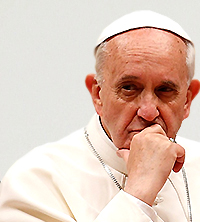
Every new encyclical of Pope Francis is an event not only for Catholics, but for the whole world. Fratelli tutti (All Brothers) is the third encyclical of Pope Francis, entitled “On the Brotherhood and Social Society”, in which he sees brotherhood and social fellowship as the way to a more perfect, just and peaceful world. It was signed on October 3, 2020.
The idea of the encyclical appeared on February 4, 2006 in Abu Dhabi during the signing of the “Human Brotherhood Document” with the Chief Imam Al-Azhar Ahmad Al-Tayeb. While working on the document, the COVID-19 epidemic broke out, the world did not show the solidarity needed to prevent a calamity.
The title of the encyclical refers to the evangelical ideal of brotherhood / sisterhood, based on one of the teachings of Francis of Assisi. Let us remember that Francis of Assisi was against property, he believed that people should use the goods and not own them.
Pope Francis’ encyclical has an influential theological and philosophical basis. It includes not only patriarchy or medieval heritage, but also modern Christian theology and philosophy. In particular, the social ideas of the famous modern philosopher Paul Ricœur occupy a prominent place in this encyclical. The Pope twice refers to his texts, as well as to the texts of his teacher, Gabriel Marcel.
The general idea of the encyclical can be generalized as a call to rebuild the international community on the principles of brotherhood and cooperation. The eighth paragraph of the first chapter of the encyclical says: “My wish is that in our time, by accepting the dignity of every human being, we can contribute to the rebirth of the cosmic aspiration of brotherhood. Brotherhood of all men and women […] Let us dream, then, as one human family, as travelers sharing the same body, as children of the same planet as our common home, each bringing the richness of each of our beliefs. Each of us with their voice, brothers and sisters, all together.”
Although Pope Francis does not explicitly use the well-known call of the French Revolution for “freedom, equality, fraternity”, he clearly expresses the view that freedom and equality become artificial if they are not based on the principle of fraternity.
According to Pope Francis, the first enemy of human brotherhood and solidarity is the wars against which the pope fights in principle. In this sense, the circular pays special attention to the issue of war, which, according to the pope, is the defeat of politics and humanity, a disgraceful concession to evil forces. It is emphasized that now, unlike in the past, there can be no question of a “just war”; we must say “no to war” resolutely. Remember one of his last appeals: “I highly assessed the ceasefire agreed between Armenia and Azerbaijan to reach a substantial peace agreement for humanitarian reasons. Although it has been proven that the ceasefire is extremely fragile, I still call for a ceasefire. I offer my condolences for the loss of human life and suffering, as well as for the destruction of homes and places of worship. I pray, I invite to pray for the victims and all those whose lives are in danger.”
Racism and discrimination against migrants is the enemy of the Christian Brotherhood. Pope Francis writes: “If everyone has an inalienable dignity, if all people are my brothers and sisters, if the world really belongs to everyone, then it does not matter if my neighbor was born in my country or elsewhere.”
Highlights of the encyclical are devoted to religious dialogue. Can the ideal of Christian brotherhood extend to other religions? Is religion to blame for this new wave of terrorism, or is it because of global inequality and injustice?
In all his encyclicals, Pope Francis has consistently noted the obvious and unequivocal contradictions between capitalism and the “Christian values”. It should be noted that it is not only the incompatibility of consumer values with Christian values. Pope Francis goes one step further, criticizing international politics, which is still based on militarism, chauvinism, and imperialism.
We have singled out some key issues from the encyclical. It is not just an internal document of the Catholic Church, it is notable for everyone, it means for Christians and non-Christians living in Armenia as well. It points to the value issues of Christianity, whether we are believers or skeptics. Only our deeds are the answer to those questions.